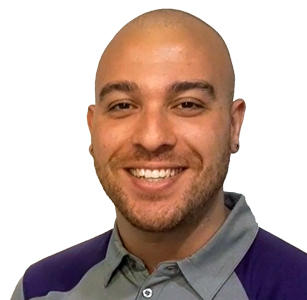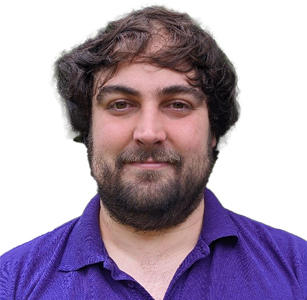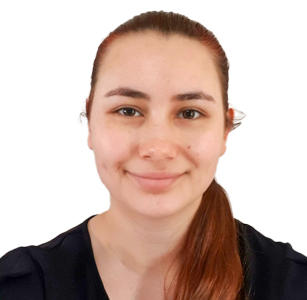Graduate stories from our Australian office
All of our graduates are employed on a permanent basis and work on real projects as an embedded and productive team member right from the start. We make sure our graduates are fully set up for success, by providing extra support, training, and networking opportunities during the first year, along with a mentor and buddy to help navigate around our organisation. Hear from some of our recent graduates about their experiences working at Leidos and how they got to where they are.
LeARN MORE ABOUT OUR GRADUATE careeRS VIEW LATEST GRADUATE JOBS
-
"There are always events being held to facilitate mingling with co-workers and celebrating of milestones and there are flexible work arrangements to suit your lifestyle supporting a healthy work-life balance."
What's your job about?
Leidos is a large scale prime systems integrator. As a software engineer, I am involved in a number of activities that are useful to our customers and help to solve their challenges. I help build deliverable software, integrate existing software, take part in ceremonial meetings based on the software engineering methodology, and team communications both online and in-person, to ensure the works progress effectively and efficiently through the day. We utilise a fairly advanced tool stack to facilitate project management and team collaboration.
The skills and experience you learn in this role are transferable to many different roles and positions throughout the IT industry, so if you are not sure this is for you, never fear, there are a whole bunch of other things you can do.
What's your background?
I grew up in the northern suburbs of Melbourne and throughout my early school years, I was not sure what I wanted to be or what I wanted do but I was always interested in computers. Since I was really young, I would help my brother in his computer business which fostered a healthy curiosity for how computers worked. Over time I understood the hardware and then began wondering about the software. For a while, the software was always an interest but I never followed that interest.
I studied business and international business at two different universities but was never really won over, I felt something was just not clicking. Later I decided it’s about time I looked into IT. That was the best decision I made throughout my tertiary education. I had found what I was really interested in and what I enjoyed. After my first year studying Information Technology I was so sure that this is what I wanted to do for a living I started job searching and attending job fairs as soon as I could. It was at the Big Meet in 2017 that I met the representatives for Leidos at one of the stands, after about two minutes of speaking with the team I knew this is the type of organisation I wanted to work in. Further research into the company solidified this gut feeling, and so I submitted my application. The first two times I applied, I made it quite far in the application process but was unsuccessful. However I was not one to give up, the third time I applied I had made it all the way to the face to face interview’s and after a short time, I received the exciting news... I had made it through. One thing I would like anyone reading this to take away is to be persistent, and do not take rejection personally, learn from it and try again. Understandably the industry is huge and thousands of applicants each just as bright and capable as the other apply to the same role, I was just humbled to be a part of the process no matter the stage. I am now in my second year working at Leidos and I could not tell you where the time has gone, I guess time really does fly when you’re having fun.
Could someone with a different background do your job?
Suppose someone wants to do the same job as you do, would that be also possible with a different background?
Yes! With an open mind and a willingness to learn, anything is possible.
What's the coolest thing about your job?
What I love about my job is the fact that as technology changes so do our approach and implementations, in turn leading to learning new things all the time. In regards to Leidos as a company however, it is a fantastic organisation which takes great care of its employees. There are always events being held to facilitate mingling with co-workers and celebrating of milestones and there are flexible work arrangements to suit your lifestyle supporting a healthy work-life balance.
What are the limitations of your job?
A steep learning curve. If one has not done anything like this before there is a fair bit to learn before being self-reliant, however again nothing an open mind and willingness to learn won’t solve. There is also the physical side, naturally, for this role you are sitting down a lot, regular walks and exercise is your friend here. Teamwork is a massive part of the job if you are alone ranger start building your team skills. In saying that however, the people at Leidos are amazing and very understanding, you’ll never feel isolated or left out, and over time you’ll be picking up the skills needed naturally.
3 pieces of advice for yourself when you were a student...
- Do what you enjoy!
- Get into industry as soon as you can, school is great, but industry is very different.
- Be persistent always!
-
"For me, this is great for staying engaged, and continuously learning new skills and growing each day."
What's your job about?
Leidos Australia is a provider of science and technology solutions to the federal government. Within Leidos I am currently working as a DevOps Engineer maintaining monitoring solutions, as well as scripting and automation. Usually, I begin with the daily engineering team stand-up meeting, where each team member outlines what their day will entail and asks any questions that might have come up on the previous day, and any team issues are addressed. Next, I will check for any new incidents assigned to me, as well as following up on any issues from the previous day or raised over night. I am then able to move onto my project work which changes from day to day and varies from working on writing designs, or attending design meetings to completing actual implementations. I also get involved in helping other projects by providing my expertise and knowledge or creating scripts that have been previously developed.
What's your background?
I grew up in the regional centre of Coffs Harbour, mostly spending my early days outdoors. Not exactly the sort of life that gets you ready for a lot of time working with computers! In my early years, I never really had an interest in computers. It was not until my parents bought the family a PC that I became the kid who could help with small computer issues—mind you I was guessing a lot of the time. In high school, I took all the computing classes available in order to learn as much as I could to further my knowledge. After school, my big opportunity came when I was offered a traineeship from my graduating high school as a network administrator and I fell in love with the IT industry. I moved to Sydney to study a Bachelor of IT, followed by a Master of Science (Internetworking) where I specialised in Network Administration and Design, as well as programming. After finishing my master’s degree, I applied for the graduate program at Leidos as a Systems Engineer. My role in the company has developed to a DevOps position which I have been in now for two years.
Could someone with a different background do your job?
It is possible for someone with a different background to do my job. In fact, a lot of people in my team have different backgrounds. Not all of them are university graduates either. I often find I learn a lot from the colleagues who do have different backgrounds. The role I am currently working in requires people who really like to solve problems. A large portion of my day is spent on tasks which involve being given a list of requirements and a deadline, and needing to create a solution that is efficient yet able to be deployed quickly. It is a challenge but when the work is delivered it feels extremely rewarding.
What's the coolest thing about your job?
The coolest thing about my job is the constant flow of new challenges. Each day brings a new task, with varying types of work so no two days are the same. One day might be focusing on a critical script that will need to be deployed to restore some form of functionality while another might be developing an entirely new system. For me this is great for staying engaged, and continuously learning new skills and growing each day.
What are the limitations of your job?
Like any job, there are peak times when we are required to work longer days in order to meet deadlines. And likewise there are times when we have some quieter periods. It’s not so much of a limitation but something to be aware of. Importantly it is not a job that you can do on your own: it is a highly collaborative role that absolutely relies on the whole team and wider organisation. I know this is something that some people might struggle with, especially coming out of university.
3 pieces of advice for yourself when you were a student...
- At university, group work is going to be hard at times - always do your best to show up for your classmates. Keep casual communication open so you know what’s going on. Be ready if you need to pick up for others and do your best to account for these times before deadlines.
- Connections are important - the friends you make at university are contacts into companies and always a good place to bounce personal ideas off. Don’t be shy and put yourself out there.
- Make time for yourself - tt is easy to let the deadlines get to you, but look after yourself and rest when you need - you’ll do better work and learn more.
-
"I’ve landed in an amazing team that has given me great development opportunities; because of this I’m now responsible for delivering a body of work within my project."
What's your job about?
My current role as a Project Coordinator is to plan and communicate upcoming activities with my team, track the budget and schedule, report our progress to the client and upper management, work with suppliers to obtain their services, and ensure the technical team have everything they need to perform their work. My role can also include writing plans for an upcoming phase of the project or working with another part of the team to gather and consolidate information.
I work in one of Leidos’ larger projects so there’s always a lot happening; because of this, there’s opportunity to work with many different people across different project areas. Working in a large team also means that you can see many different working styles and can pick and choose what others do that you may want to implement.
My advice for project management graduates (in particular ones with a limited IT background) is to proactively learn technical information from teammates such as Solution Architects, Software, Network and Database Engineers etc. Although project management principles apply to many fields, having domain-specific knowledge will make you a more understanding and effective project manager.
What's your background?
I grew up in Brisbane in an area surrounded by bush, so I was lucky enough to experience living alongside lots of native animals around like wallabies, goannas, bush turkeys, and carpet pythons.
For many years I planned to be a research scientist and so I studied a Bachelor of Biomedical Science. After working in three different research laboratories, I realised that although I love science the day-to-day life of a researcher wasn’t for me. I decided to start anew by moving to Melbourne and studying a Graduate Diploma of Business. During my studies, I interviewed at Leidos and was accepted into the 2019 grad program as a Project Coordinator. I’ve been a Project Coordinator at Leidos for two years and am really enjoying it here.
During my time at Leidos, I’ve worked in a Proposal team in Leidos’ Business Development area and in two different projects during the execution and project closure phases. The Business Development area of Leidos is quite different to the project side; I think it’s a valuable experience to first work in a project and then get involved in some proposal work.
Could someone with a different background do your job?
Yes, someone with a different background to me could definitely perform my job. I’m a Project Coordinator working in IT however my background is neuroscience, genetics, and business. Whilst taking some more IT courses at university would have helped, a lot of the skills and knowledge required in my role is specific to my project or the governance structure and processes which I need to comply with. As long as you actively learn and ask questions along the way it’s possible to build the skills to work in an area you don’t have an extensive background in.
What's the coolest thing about your job?
I’ve landed in an amazing team that has given me great development opportunities; because of this I’m now responsible for delivering a body of work within my project. My favourite part of the job is when my team and I achieve a key milestone after many months of hard work.
My role also requires me to interact with lots of people including the technical team, upper management, and external suppliers. I enjoy building relationships with team members and suppliers outside of Leidos as most people I’ve worked with have a really good sense of humour which makes work really enjoyable.
What are the limitations of your job?
Because I’m responsible for delivering a body of work I have to obtain resources, closely track the finances, and schedule and report my team’s progress. Although my team is amazing and always available to help, I tend to put pressure on myself to ensure I feel in control of what I’m responsible for delivering.
Project Coordinators have to make lots of phone calls and interact with many people. Someone who doesn’t enjoy talking to people and building relationships with others would likely not enjoy this job, having said that you don’t need to be extrovert to do well in this role.
3 pieces of advice for yourself when you were a student...
- Taking the occasional early study break or going on that three-day road trip won’t hurt your results, you’ll come back refreshed and be more efficient when you return to study.
- Keep in contact with lecturers and tutors; they may know of potential job opportunities or become a mentor.
- Your limited work experience doesn’t make you less valuable than someone with more experience. You will be able to work with the same confidence and capability that others possess with time; as long as you do the best that you can with the skillset you have at the time then that’s enough.
-
"There is trust there from management and it makes work a lot more enjoyable."
What's your job about?
Leidos Australia is an information technology contractor that targets various government, defence, intelligence and health projects. I work on a project called JP2096 which is in the area of intelligence and is also often referred to as “Google for Defence”. This project aims at unifying various defence data sources so users can find what they are looking for easier. There are also a number of bells and whistles in the system that make analysing and looking for trends easier which means more informed and efficient decisions.
An average day for me looks something like the following:
- Get into work, check Slack for any team or project updates.
- Either continue working on or pick up a new Jira ticket from the Scrum Board. For my team, this means a 3-5 day chunk of work on some part of the system. These can touch on one or more technologies and include a variety of things e.g. java/python code, automated deployment scripts, an investigation into open-source software, etc.
- Lunch at midday. Usually, walk to somewhere in Melbourne CBD.
- Often there are meetings to discuss a new component design. You can get as involved with this as you want. I enjoy being involved in the designing stage so I end up in quite a few of these meetings.
- In between working on my own tickets and meetings, I review other people’s work to make sure we are all at the team standard.
- Go home on time.
What's your background?
I grew up in Melbourne and have lived there all my life. Following high school, I wasn’t sure what I wanted to do but ended up in a Bachelor of Science at Monash University. I finished that and then followed it up with an honours year in Genetics. I did really well so afterwards there were a few labs wanting me to do a PhD with them. I lasted about a year into a PhD and then decided that this wasn’t how I wanted to live my life and quit. Looking back it was the best decision I have made and I only wish I had done it sooner.
I spent the next few years in casual jobs before I started to think about getting qualified in something else. I considered a number of things before I landed on a Masters of IT. Some of my friends would later tell me when they heard about it, it just seemed right. A couple of years later I was applying to graduate positions and a friend pointed me to Leidos, who I had never heard of before. They seemed to be doing cool things and be all about technology so I was keen. I put in an application, had a phone interview and then a face to face interview. I got offered the job soon after that. It was a bit of a different journey to end up in this position, but I’m very happy how it turned out.
Could someone with a different background do your job?
I often tell people that anyone who can think and problem solve could do my job. Sure there are some things you learn in computer science and it would be difficult to ramp up in programming knowledge if you had never done that before. However, if you wanted to, and had the drive to learn, then anyone could do it. A degree can help you get through the door, but being able to learn new skills and then teach other people will help you do well once you are there.
What's the coolest thing about your job?
What I love about my job is the work-life balance it offers. This includes being able to work your hours at a time that suits you and being able to leave for the day without expectations of unpaid overtime. As long as you do your hours for the day and are at work for key meetings, the time you come in and leave is pretty flexible. There is trust there from management and it makes work a lot more enjoyable. I also go to work enjoying the idea that what I am doing has a positive impact on people and Australia as a whole, rather than just being about the bottom line.
What are the limitations of your job?
The project you first get to work on is very dependent on what is available at that time. You could get lucky, as I did, and land in a big project that is just at the beginning stages, or you might end up in a project you don’t enjoy much. Rotations are not as readily available due to the nature of the work, but if you make it clear what you want then from my experience Leidos will try to help you make it happen.
3 pieces of advice for yourself when you were a student...
- Prepare for your interviews by having a list of prepared answers to typical interview questions in the STAR method. You might have heard it before, but it works.
- Don’t keep doing something you are not enjoying. You don’t have to enjoy it all the time, but if it’s none of the time, then look elsewhere to what might suit you better.
- A good work ethic is not something you start once you hit the workplace. Do it now.







